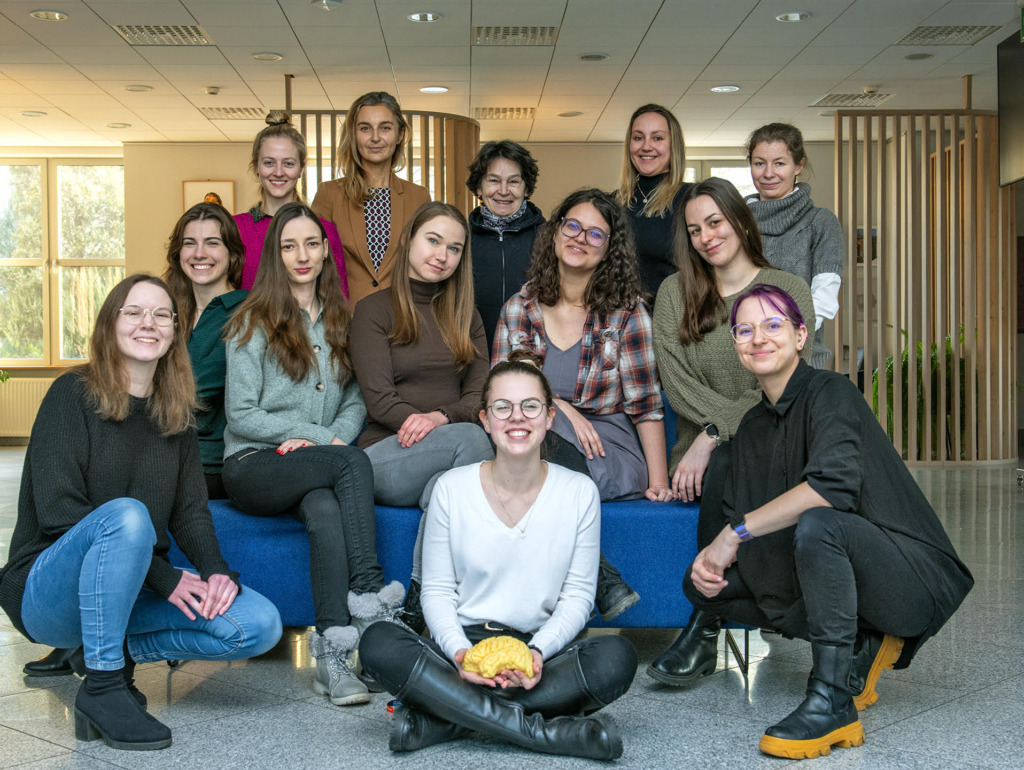- Head of laboratory
- Scientific Staff
- Technician and administration staff
- PhD Students
- Research profile
- Methods
- Current research activities
- Selected publications
Head of laboratory

Research profile
Research activities of our laboratory are focused on the neurobiological basis of language skills in typical and atypical development. We are particularly interested in the mechanisms of typical and atypical literacy acquisition in children. Our investigations involve characterizing the predictors of developmental disorders, particularly language-based learning disabilities as well as testing different evidence-based interventions. Additionally we aim to uncover a universal brain organization for spoken and written language independent of orthography (contrasting orthographies differing in phoneme-grapheme transparency) or sensory modality (contrasting visual reading in sighted and tactile reading in blind). We also strive to understand the long-term consequences of late language emergence in children at both behavioral and neural level.
Another line of research refers to the issue of the relationship between consciousness/self-consciousness and language. We aimed at investigating whether conscious and unconscious processing of verbal information (in comparison to non-verbal information) is prioritized if such information is self-relevant.
Methods
Our research is performed with the use of non-invasive neuroimaging methods – functional (fMRI) and structural (sMRI) magnetic resonance imaging as well as electroencephalography (EEG). We study brain function based on fluctuations in BOLD signal, event-related potentials (ERP) and oscillatory brain activity (FFT). Neuroanatomical studies are performer with the use of voxel (VBM) and surface (SBM) based morphometry as well as diffusion tensor imaging (DTI). To study the concentration of neurotransmitters non-invasively we employ magnetic resonance MEGA-PRESS spectroscopy.
Current research activities
- Prediction of language skills in children based on brain structure
- Brain basis of literacy acquisition in children
- Preferential memory for self-related verbal information
- Behavioral and neuronal basis of dyslexic subtypes
- Developmental changes related to Braille reading acquisition in the blind
- The influence of extra-large letter spacing on reading in children
- Long-term consequences of late language emergence in children
Selected publications
Chyl K, Kossowski B, Dębska A, Łuniewska M, Banaszkiewicz A, Żelechowska A, Frost SJ, Mencl WE, Wypych M, Marchewka A, Pugh KR, Jednoróg K. (2018). Prereader to beginning reader: changes induced by reading acquisition in print and speech brain networks. J Child Psychol Psychiatry. 59(1):76-87.
Ramus F, Altarelli I, Jednoróg K, Zhao J, Scotto di Covella L. (2018). Neuroanatomy of developmental dyslexia: Pitfalls and promise. Neurosci Biobehav Rev. 84:434-452.
Łuniewska M, Chyl K, Dębska A, Kacprzak A, Plewko J, Szczerbiński M, Szewczyk J, Grabowska A, Jednoróg K. (2018) Neither action nor phonological video games make dyslexic children read better. Sci Rep. 8(1):549.
Plewko J, Chyl K, Bola Ł, Łuniewska M, Dębska A, Banaszkiewicz A, Wypych M, Marchewka A, van Atteveldt N, Jednoróg K. (2018) Letter and Speech Sound Association in Emerging Readers With Familial Risk of Dyslexia. Front Hum Neurosci. 12:393.
Nowicka MM, Wójcik MJ, Kotlewska I, Bola M, Nowicka A (2018) The impact of self-esteem on the preferential processing of self-related information: Electrophysiological correlates of explicit self vs. other evaluation. PLoS One 13: e0200604.
Wójcik MJ, Nowicka MM, Bola M, Nowicka A (2019) Unconscious detection of one’s own image. Psychol Sci (accepted for publication)

